In Memory of My Grandpa
At 1:00 PM on January 12, 2025, my father called me to say that my grandpa had suddenly passed away at home that afternoon.
Grandpa’s Lifetime in Geology
When my grandpa was young, he was a top student. In the late 1950s, he was admitted to Beijing Geological Institute (the predecessor of China University of Geosciences) to study mechanical engineering. At that time, Beijing Geological Institute was a prestigious university that produced many talents. Premier Wen was his junior, and “Father of Chang’e” Ouyang Ziyuan was his senior. Of course, my grandpa was far from being an outstanding alumnus of Beijing Geological Institute. In his junior year, the Sino-Soviet split occurred, and all Soviet experts withdrew, leaving no one to teach. In his senior year, grandpa joined the Institute of Geography of the Chinese Academy of Sciences and became an ordinary geologist.
Although grandpa’s position was not fieldwork, mainly conducting research in the lab, he often had to travel across the country for geological exploration. Geological exploration was not tourism; living rough was the norm. Transportation was not developed back then, and just taking a green train to the destination took several days. The places he went to were remote (places with many people didn’t need exploration), with wild mountains and waters. It was not uncommon to encounter wild animals while camping in the wild or geological disasters halfway up the mountain. There were no mobile phones or GPS back then; if you got lost, you might end up staying in the mountains.
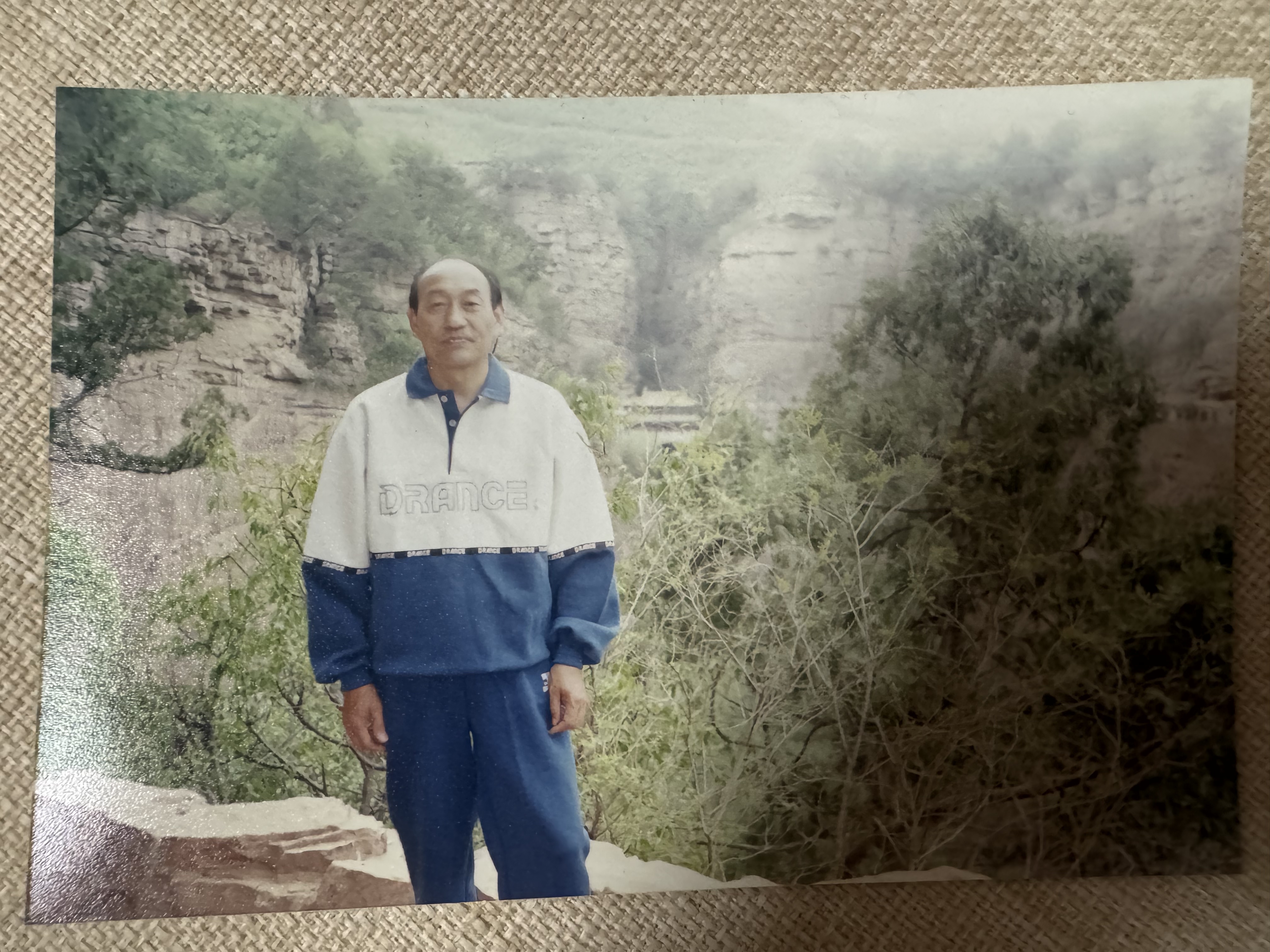 A photo of grandpa from the family album, taken after his retirement during a mountain climb
A photo of grandpa from the family album, taken after his retirement during a mountain climb
Grandpa and grandma were introduced to each other for marriage. After getting married, grandpa still had to work in Beijing, coming home once every month or two. At that time, it was still a green train, and it took 7 hours just on the train from Shijiazhuang to Beijing, which was quite exhausting.
My grandpa was the only son in his family, and his parents felt he should come back earlier to accompany the family, so they had grandpa transferred back to Shijiazhuang to work at the Hebei Provincial Bureau of Geology and Mineral Resources. In Shijiazhuang, grandpa gradually moved away from the front line of scientific research and shifted to administrative work.
Grandpa had deep feelings for his workplace. After retirement, even though the bureau arranged for everyone to buy better elevator apartments, grandpa insisted on living in the old house behind the unit. The old house had no elevator and was on the fifth floor. Grandpa said his legs were good, and he was willing to climb the stairs every day. But in recent years, grandpa’s legs were not good, and he couldn’t go downstairs, so he had to stay at home.
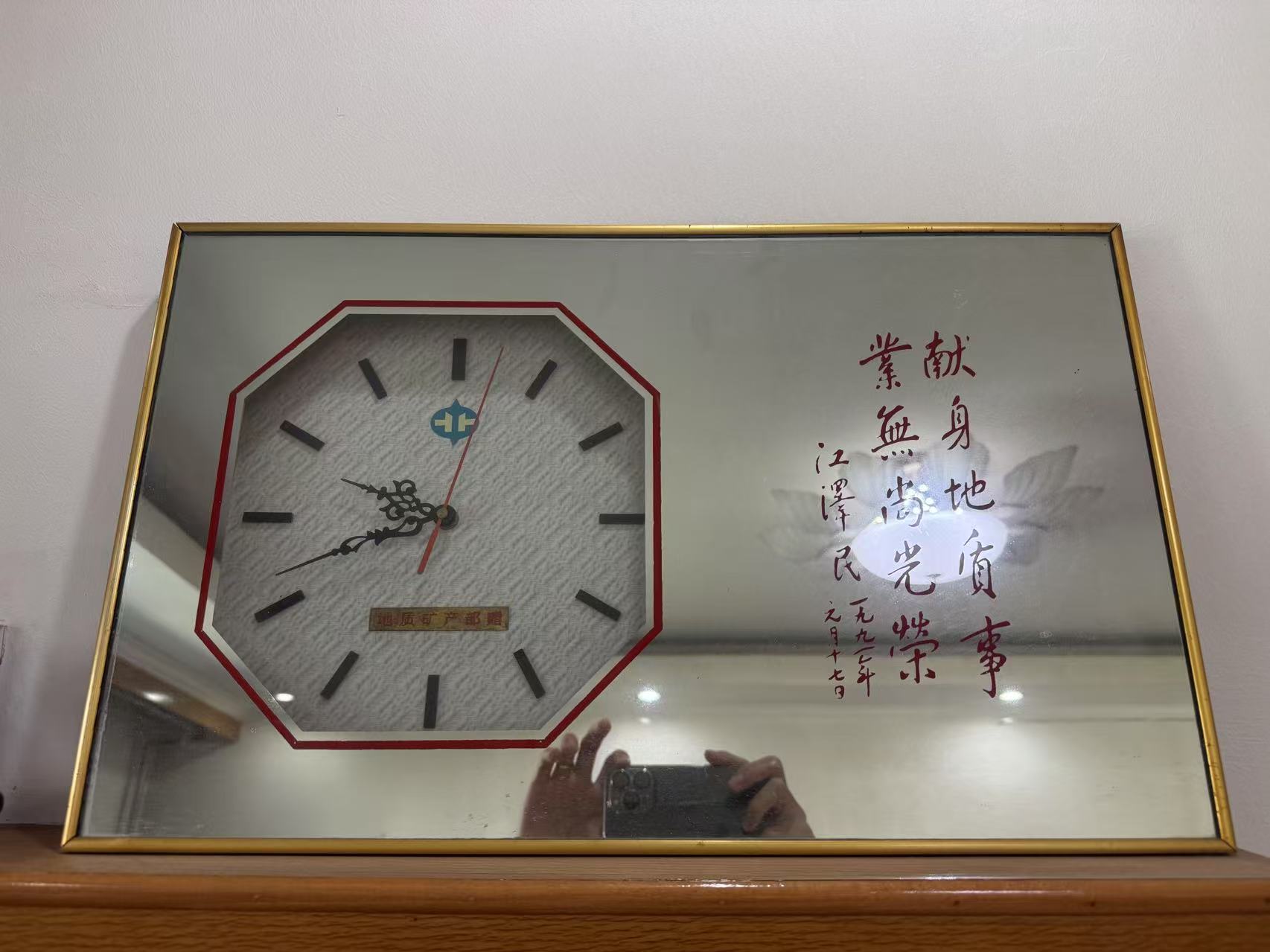 The clock at grandpa and grandma's house was issued by grandpa's unit and has been running for over twenty years
The clock at grandpa and grandma's house was issued by grandpa's unit and has been running for over twenty years
Ten years ago, the Hebei Provincial Bureau of Geology decided to build a geological museum, encompassing the work achievements of many of grandpa’s colleagues over the years and collecting many beautiful mineral specimens from around the world. The Hebei Geological Museum opened to the public in 2017, and grandpa felt that a lifelong wish had been fulfilled. Grandpa said, the value of a person’s life is to leave something for future generations. Grandpa’s words greatly influenced me, and I also hope to do something of lasting value.
Online Tour of Hebei Geological Museum
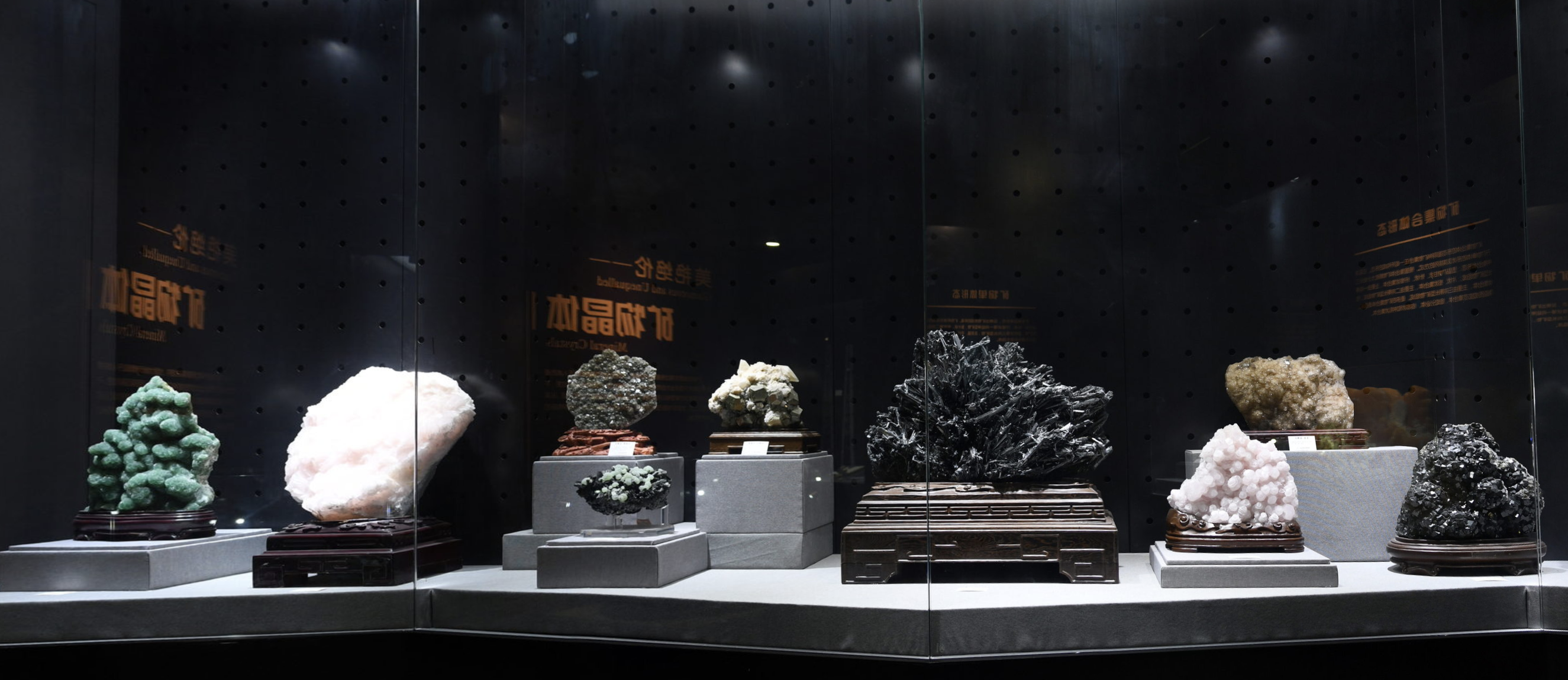 Mineral crystals in the Hebei Geological Museum. When I was in college, grandpa gave me a fossil he collected when he was young
Mineral crystals in the Hebei Geological Museum. When I was in college, grandpa gave me a fossil he collected when he was young
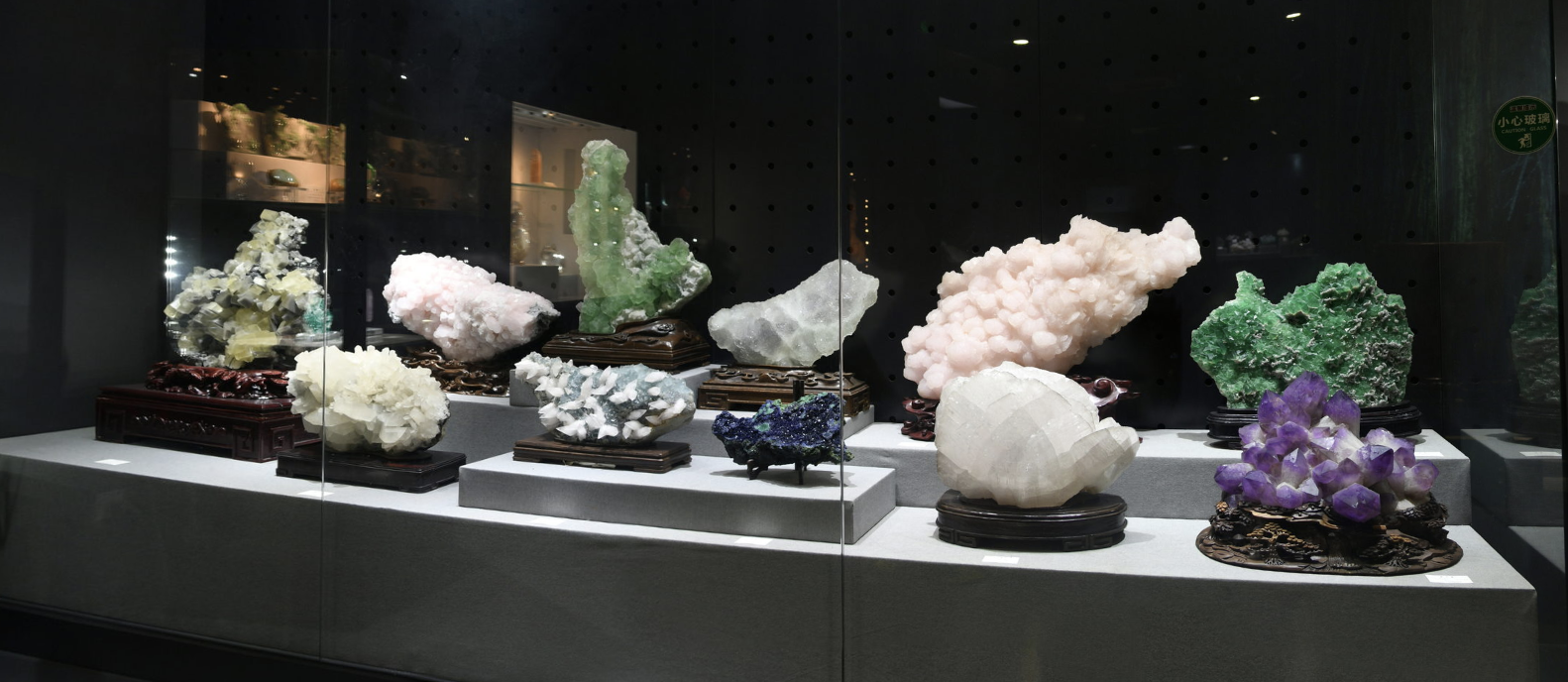 Mineral crystals in the Hebei Geological Museum
Mineral crystals in the Hebei Geological Museum
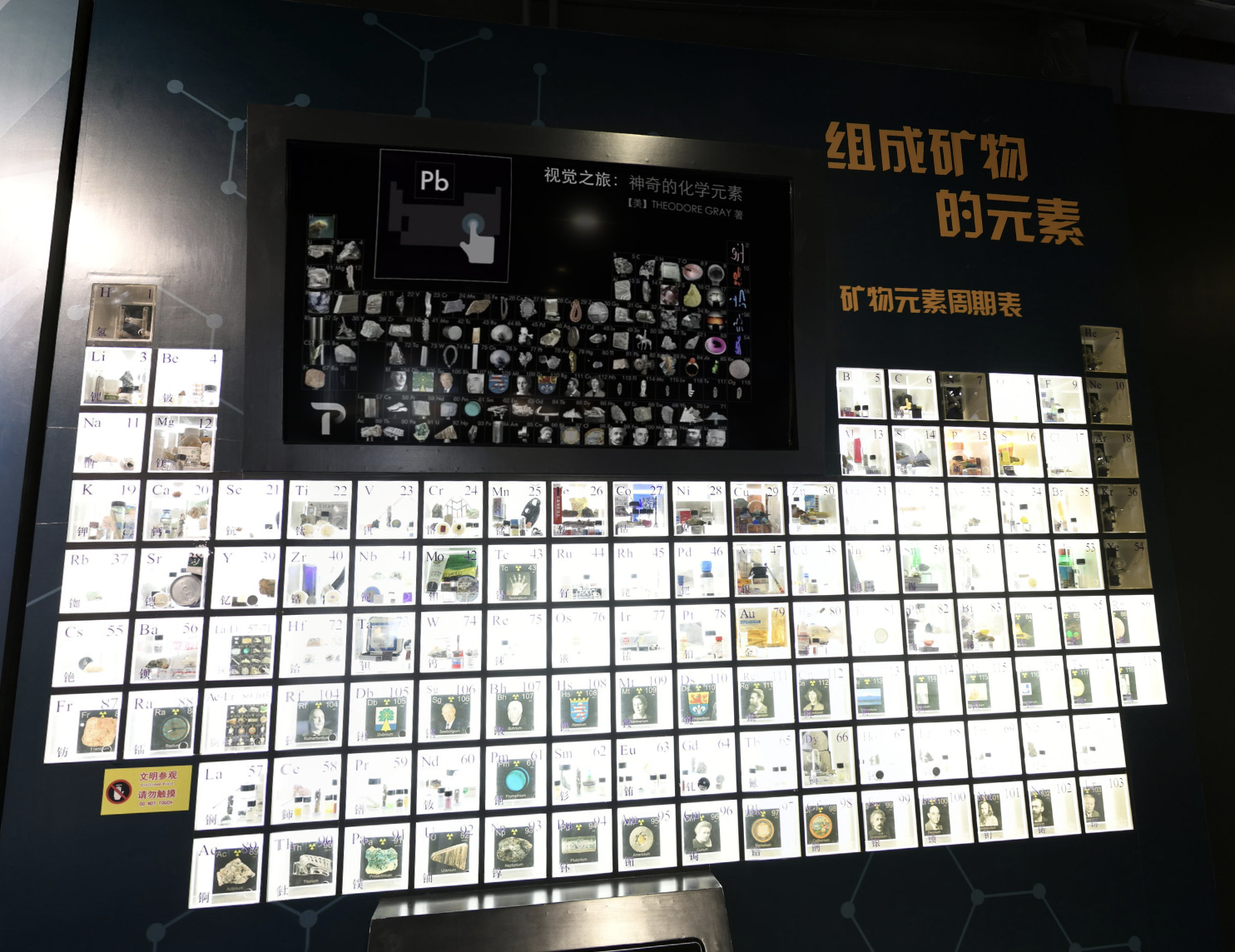 Periodic table in the Hebei Geological Museum. I later imitated this and collected many chemical elements myself. Be careful with this; the assembly head at MSRA got leukemia from collecting radioactive elements and died young. I was also invited for tea by Uncle Hat for collecting dangerous elements.
Periodic table in the Hebei Geological Museum. I later imitated this and collected many chemical elements myself. Be careful with this; the assembly head at MSRA got leukemia from collecting radioactive elements and died young. I was also invited for tea by Uncle Hat for collecting dangerous elements.
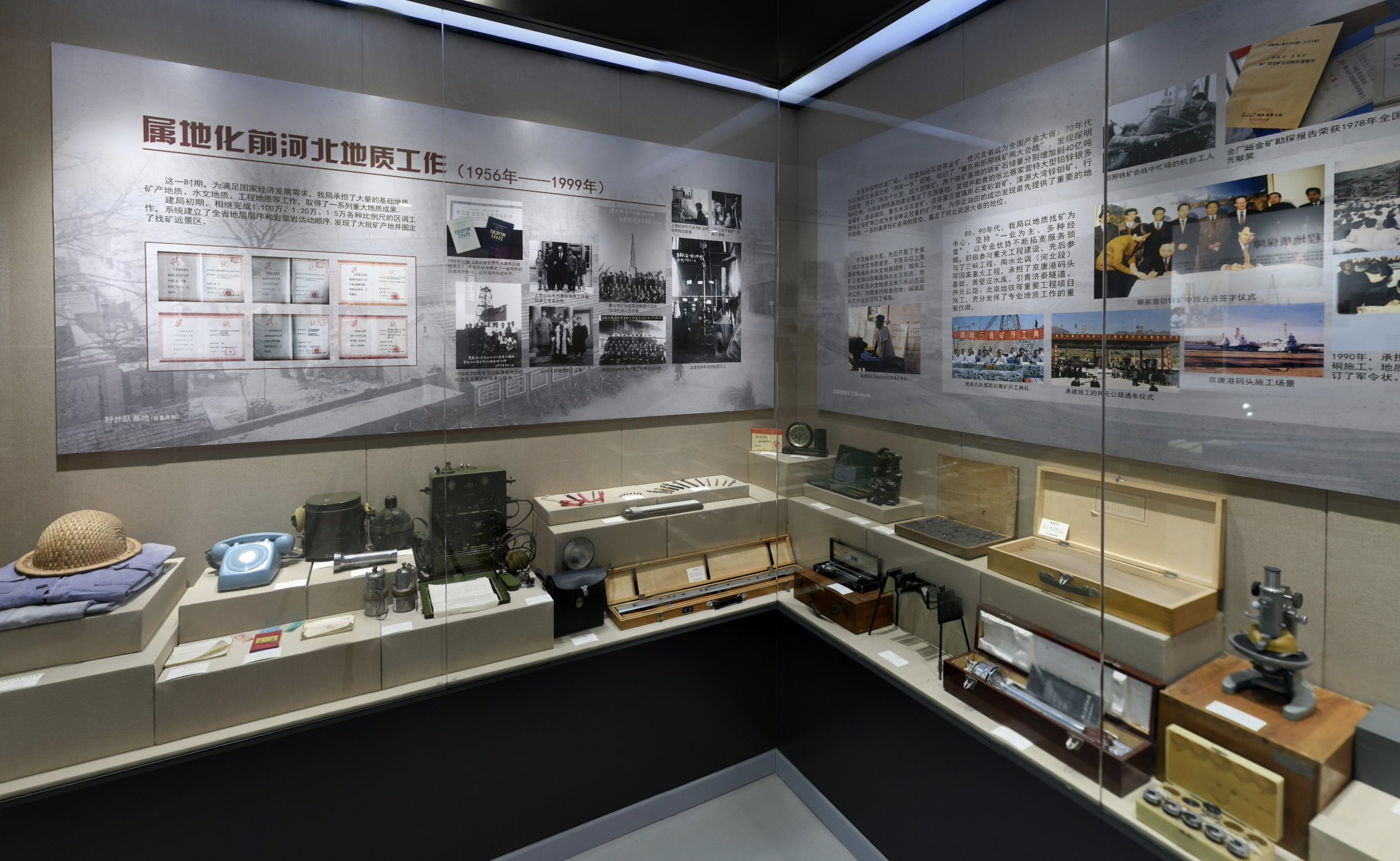 Grandpa's work content at the Geological Bureau back then
Grandpa's work content at the Geological Bureau back then
Grandpa Taught Me to Read and Write
When I was born, my parents were busy with work, so I was mainly raised by grandma and grandpa when I was young.
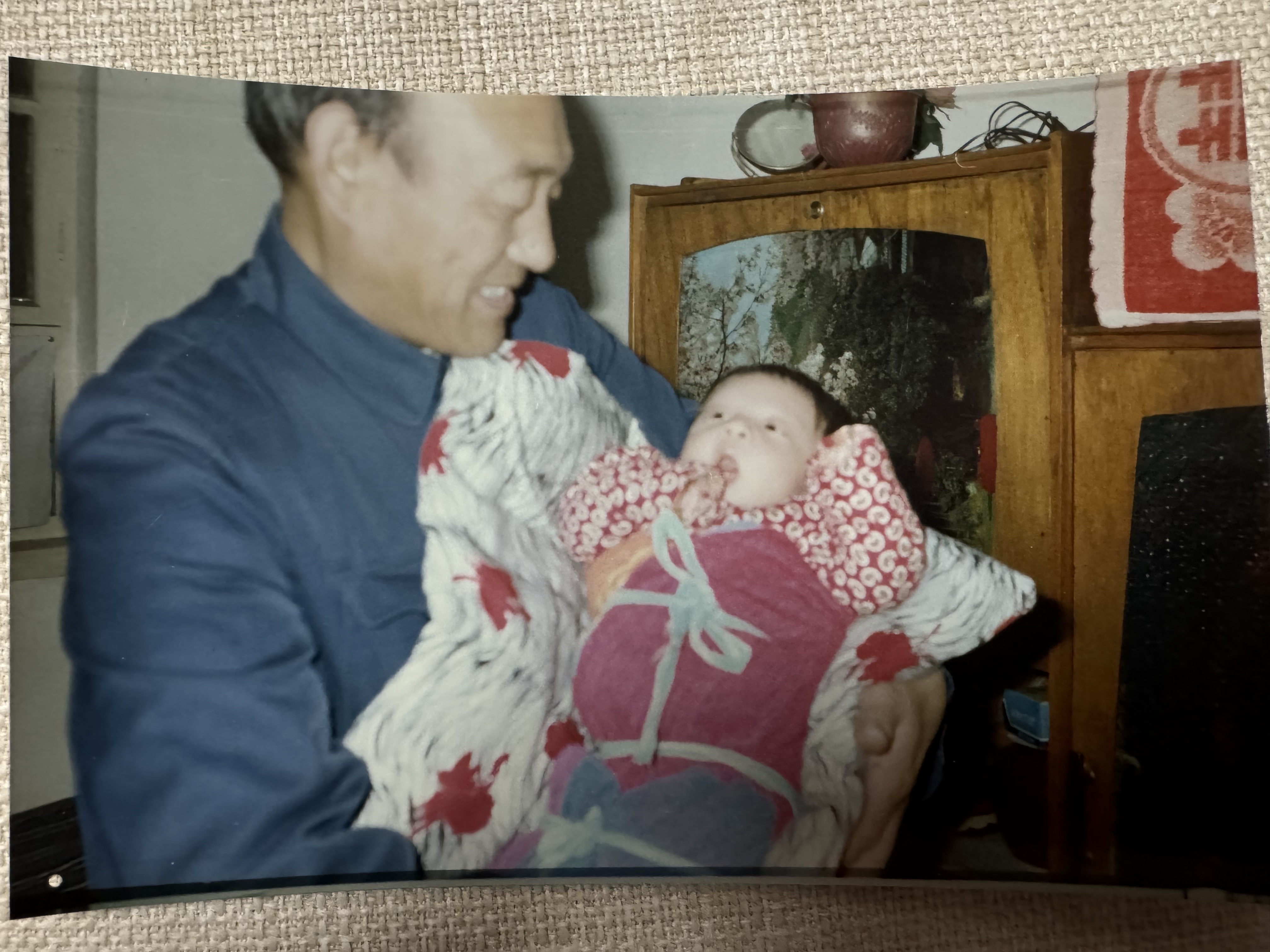 Grandpa holding me when I was young
Grandpa holding me when I was young
Grandpa and grandma both placed great importance on my education. From the moment I was born, before I could even speak, grandpa and grandma taught me to recognize characters. Grandma told me stories, read poems, and played children’s tapes every day. Grandpa took me out to the street every day, teaching me to recognize the characters on shop signs, road signs, and bus stop signs. By the time I was one and a half years old and just learning to walk, I could recognize most of the characters on the street signs near our home. Neighbors gave me a nickname, “the child who can recognize characters.”
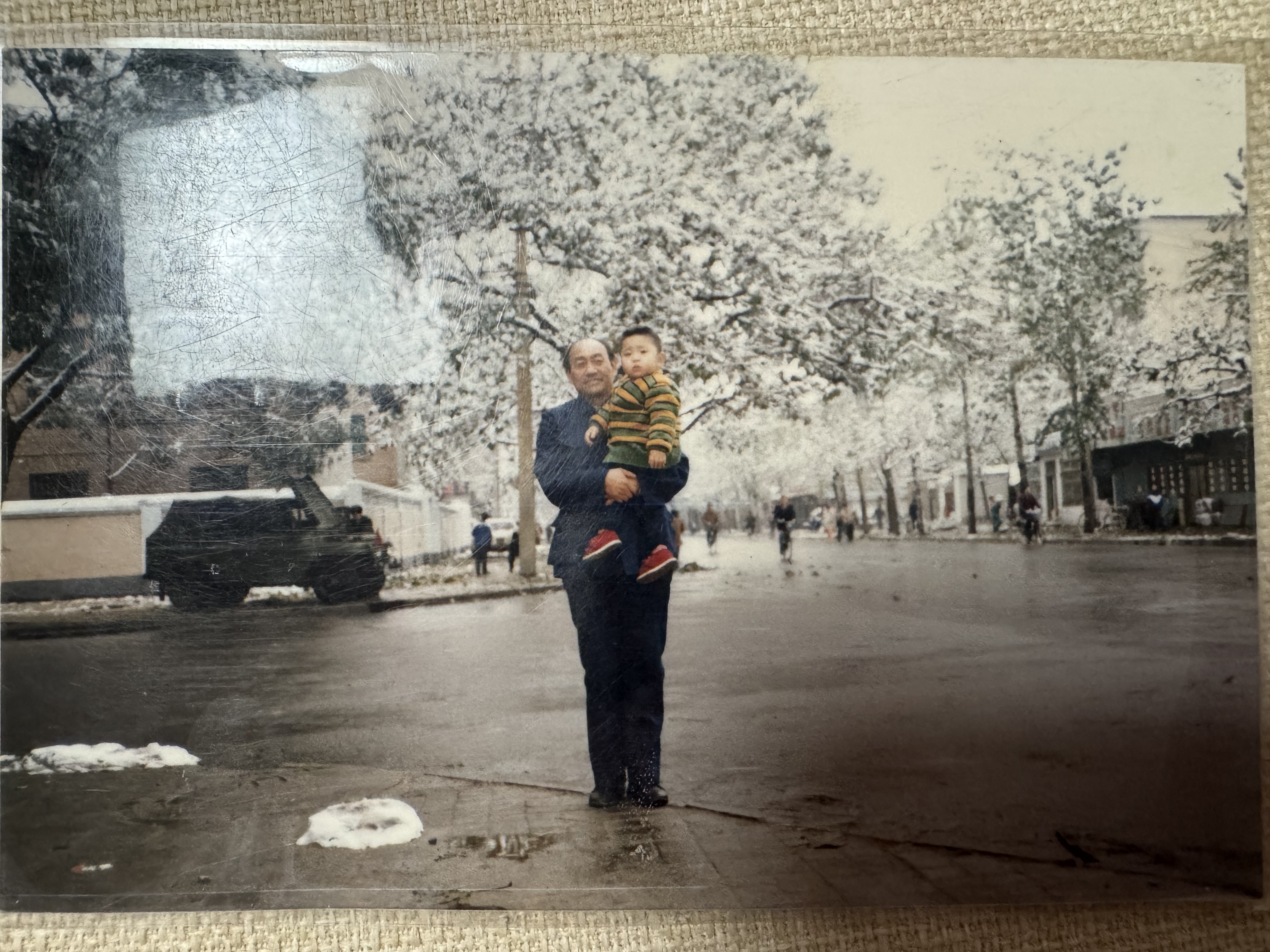 Grandpa holding me on the street to recognize characters
Grandpa holding me on the street to recognize characters
Besides recognizing characters, my grandpa also taught me to recognize maps. My grandpa said,
From the time I was born, my parents maintained a “Little Miao is Growing” commemorative book, recording my growth every month with a photo attached. Below is the content of the growth record part, which should also be the first public release of these growth records:
 One month old
One month old Two months old
Two months old Three months old
Three months old Four months old
Four months old Five months old
Five months old Six months old
Six months old Seven months old
Seven months old Eight months old
Eight months old Nine months old
Nine months old Ten months old
Ten months old Eleven months old
Eleven months old Twelve months old
Twelve months old
 One and a half years old, already recognizing 200 characters
One and a half years old, already recognizing 200 characters
 Two years old, already recognizing 1200 characters, can count from 1 to 100
Two years old, already recognizing 1200 characters, can count from 1 to 100
 Two and a half years old, already recognizing 3000 characters, can read newspapers
Two and a half years old, already recognizing 3000 characters, can read newspapers
The next step after recognizing characters is writing. Starting at age two, grandma and grandpa taught me to write on a blackboard. Before I was three, I could write hundreds of characters.
 Three years old, can write on the blackboard with chalk
Three years old, can write on the blackboard with chalk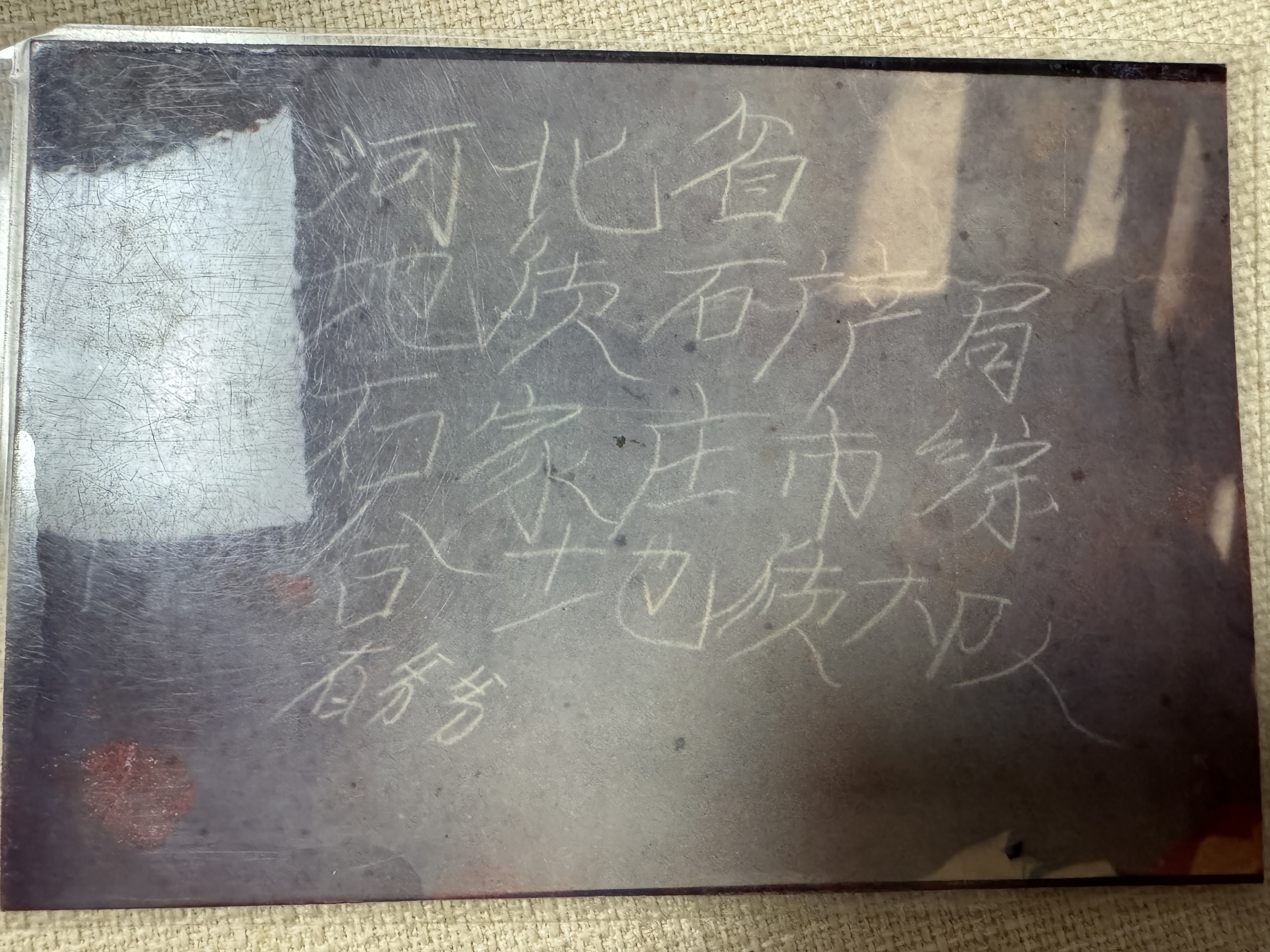 Before I was three, I could write the name of grandpa's unit, taken in September 1995
Before I was three, I could write the name of grandpa's unit, taken in September 1995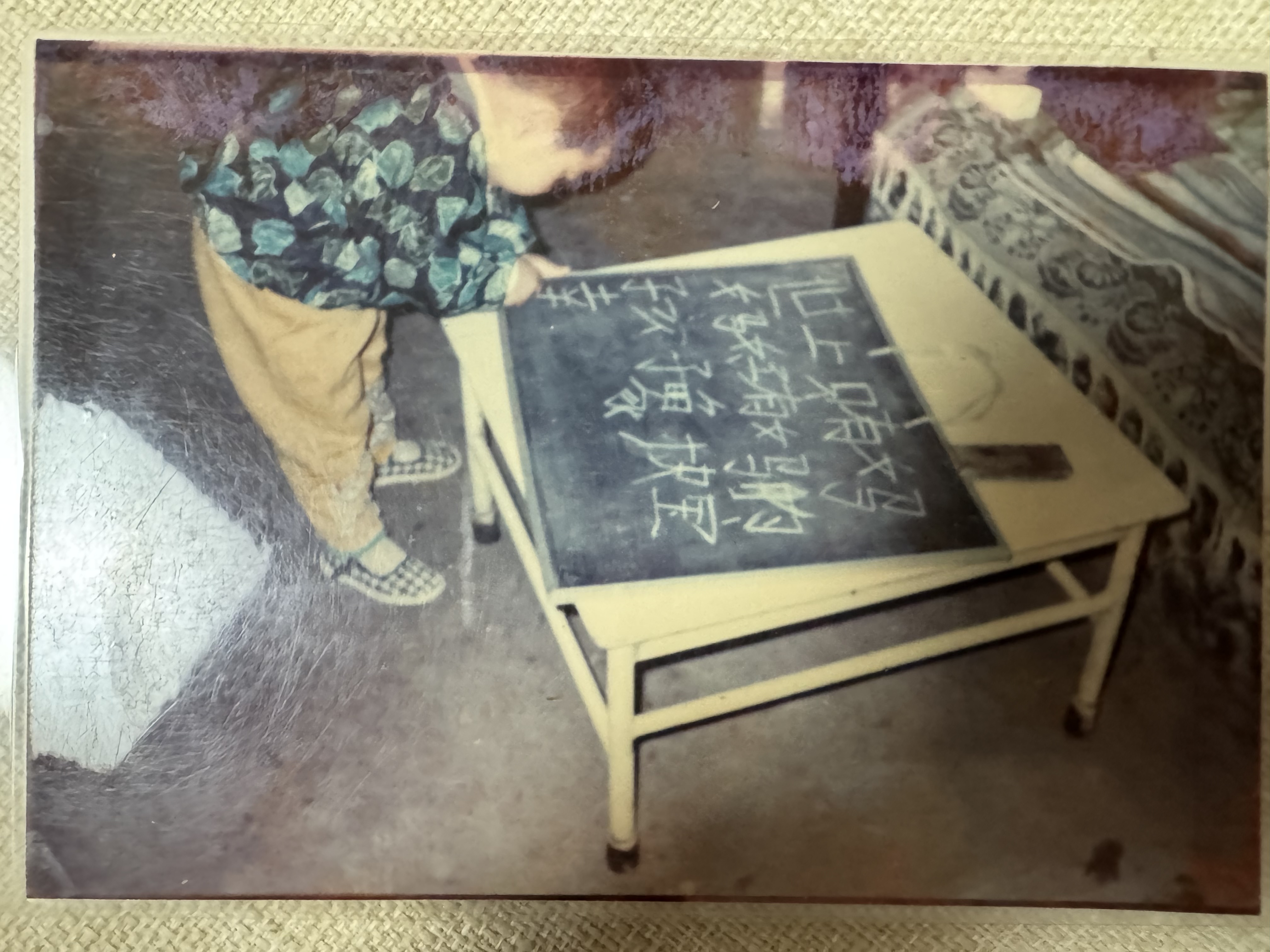 Before I was three, I could also write "The World Only Has a Good Mother," taken in September 1995
Before I was three, I could also write "The World Only Has a Good Mother," taken in September 1995
 When I was almost four, the last page of the growth record was already written by myself: I like to eat meat dishes and instant noodles, sing, exercise, and write. At home, I started attending Hebei Provincial Second Kindergarten at three years and nine months old, in Class Three. Li Bojie, October 10, 1996
When I was almost four, the last page of the growth record was already written by myself: I like to eat meat dishes and instant noodles, sing, exercise, and write. At home, I started attending Hebei Provincial Second Kindergarten at three years and nine months old, in Class Three. Li Bojie, October 10, 1996
Grandpa Taught Me to Recognize Maps and Find My Way in the Wild
Perhaps due to professional habits, my grandpa taught me to read maps and find my way from a young age. Before I could walk independently, grandpa would carry me on the street, and when someone asked for directions, grandpa would have me point the way. Passersby would say how could such a young child know how to give directions. Of course, I don’t remember those things; grandpa told me later. After I started going to school independently, grandpa would tell me that if I got lost, it would be an embarrassment to him.
Grandpa told me, reading maps and finding your way is not difficult; the most important thing is to understand your position and the cardinal directions. Whether in the city or the wild, it’s the same. In the city, as long as you mark the roads and key landmarks on the map before setting out, and don’t get the direction wrong while walking, finding one landmark after another will surely lead you to your destination. In the wild, you need to follow the map, using a topographic map and compass to find out where you are and which direction you’re facing. Grandpa said, “As you walk, the map moves in your mind,” as long as you have the map in your heart, it’s hard to get lost.
When I was in elementary and middle school, grandpa would accompany me on bike rides on weekends. He rode a 28, and I rode a 24, circling the second ring road for 40 kilometers. We also went to nearby fields to pick wild vegetables and catch insects. Grandpa would also ride with me to the mountains west of Shijiazhuang to climb and collect stones. This trained my endurance and made me believe I could travel far. Grandpa said I should remember what my middle school homeroom teacher Lei Yong said about “The Road Less Traveled,” to find good stones, you must walk the road less traveled.
Of course, to walk the road less traveled, you must first have wilderness survival skills, not just knowing how to find directions but also recognizing dangers, understanding your physical limits, and planning the safest, most efficient, and fastest route from one place to another. Unfortunately, when I was young, I only knew how to study at home and didn’t have the opportunity to learn wilderness survival skills from grandpa.
In April 2024, I went on a business trip to Dubai and happened to encounter a once-in-75-year flood. Dubai, originally a desert city, had poor drainage, and the city quickly fell into chaos. The airport turned into a “lake,” and planes on the tarmac looked like boats floating on water.
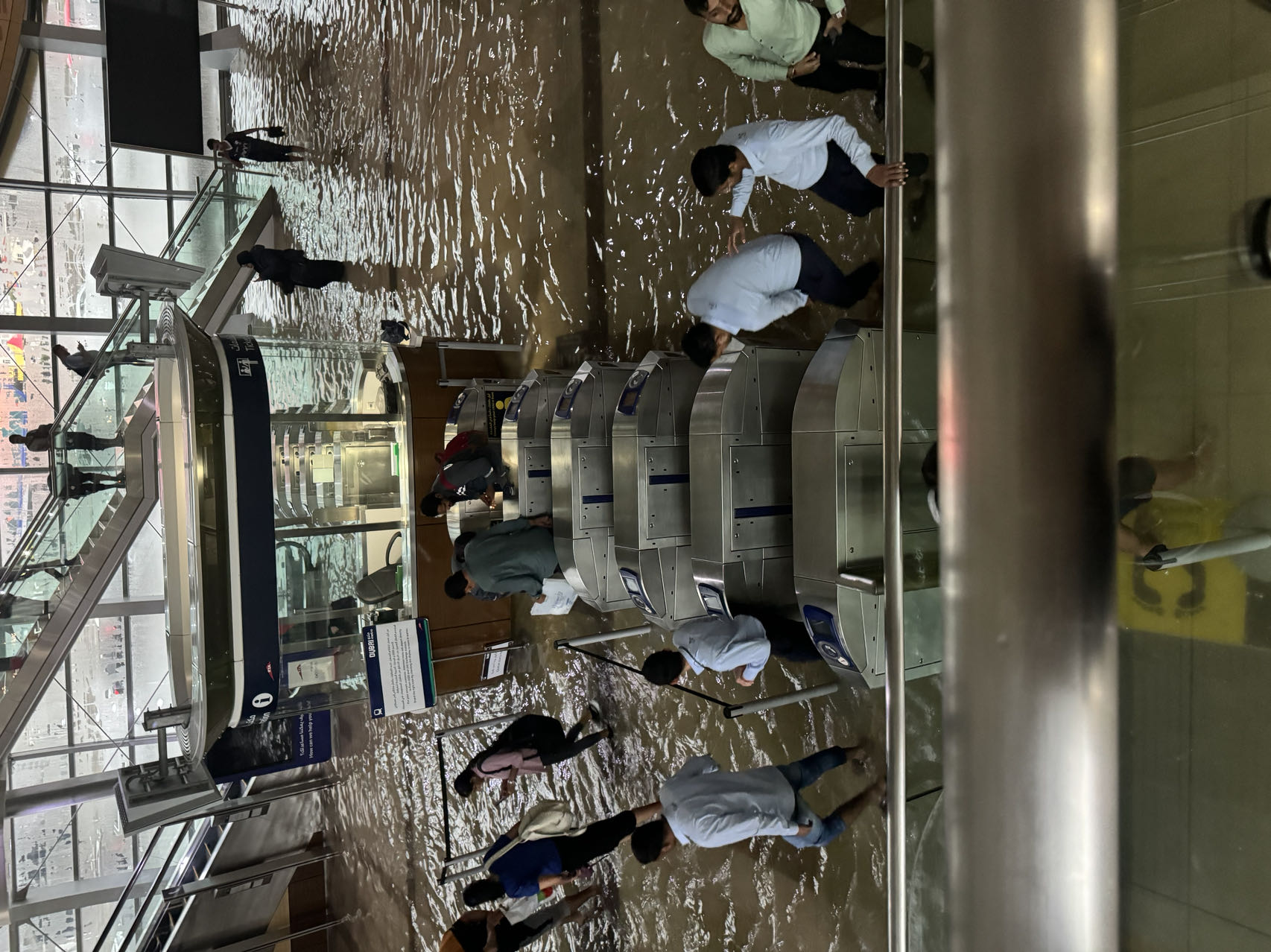 During the Dubai flood, the subway station was flooded, and the subway was suspended
During the Dubai flood, the subway station was flooded, and the subway was suspended
The subway stopped halfway, and the station was flooded. I sheltered from the rain in a McDonald’s, and the rain only subsided a bit by 8 PM. The city’s transportation had completely collapsed. I happened to meet someone else working in Web3, and we decided to return together. I said it was only 10 kilometers, and we could walk back in a little over two hours. He thought walking 10 kilometers was too far, but I said I often ran 10 kilometers and cycled 100 kilometers to and from the Great Wall with my wife. He thought about it and realized, oh, 10 kilometers isn’t that much exercise.
The water got deeper as we walked, initially just over our feet, but most of the route was knee-deep in floodwater. The flood wasn’t flowing, so it wasn’t too dangerous. The biggest potential danger was falling into a manhole or stepping on exposed wires. So we walked along the center guardrail of the road, lining up with the locals. He said that without me, he definitely wouldn’t have dared to walk in such water.
If it weren’t for grandpa teaching me to read maps and find my way in the wild, I wouldn’t have dared to walk 10 kilometers in a foreign city in a once-in-a-century flood.
Grandpa often said, “Read ten thousand books and travel ten thousand miles.” He mentioned that the places the Red Army passed during the Long March had many beautiful landscapes, though they certainly had no time to appreciate them during battles. Without visiting in person and merely relying on hearsay, how can one truly know if a place is good or not? In fact, I have never been to western Sichuan. According to my travel records from 2012 to the present, I’ve visited 82 cities in the past 12 years, but still not as many as Grandpa. I hope that in my lifetime, I can visit more cities than he did.
The DIY Lab at Home
Grandpa cultivated my interest in science from a young age. In elementary school, we had natural science classes, but they mostly covered theory. Occasionally, there were demonstration experiments, but the teacher would just quickly go through them in front of dozens of students, with no chance for hands-on experience. Grandpa collected many everyday items and set up a DIY lab for me on the balcony.
As a child, I often fell ill and had to receive IV drips and injections several times a year. After my grandmother took me to the hospital or clinic for treatment, she would bring back the IV bottles and syringes, fill them with water, and use them to water plants or conduct other experiments. I also collected beverage bottles at home. Occasionally, Grandpa and Mom would bring back discarded beakers, test tubes, and measuring cups from their workplaces. After each repair of the telephone poles in the yard, the discarded enameled wires would be left on the ground, and we would collect the colorful wires for circuit experiments.
After third or fourth grade, Grandpa began teaching me how to creatively use everyday items at home for DIY projects. In fourth grade, I made a small suspension bridge; in seventh grade, I made insect specimens and cell models and even participated in a school model airplane competition. A few years ago, when I first started dating my wife, I gave her a bat specimen, which scared her half to death. Later, when she found out I had various insect specimens at home, she asked me to hide them so she wouldn’t see them.
 Making a small suspension bridge in fourth grade
Making a small suspension bridge in fourth grade
Thanks to the DIY lab Grandpa set up for me, I never found natural science boring. On the contrary, I found scientific exploration fascinating. This method of learning through exploration not only taught me concepts and calculations but also helped me understand clear physical images. As a result, I had a deeper understanding and stronger memory of this knowledge, making it hard to forget even after many years.
Writing Essays, Publishing Them, and Recording Life
Grandpa not only encouraged me to do DIY projects but also to write essays summarizing them to improve my writing skills. Additionally, he encouraged me to write about interesting events and important milestones in life.
Grandpa said that written articles shouldn’t just be for oneself; they should be submitted for publication, as published articles have value. Without submitting them for publication, it’s hard to objectively evaluate the quality of the writing and make progress.
I submitted some essays I felt were well-written to newspapers. When they were rejected, Grandpa would guide me in revising them and trying other newspapers. He also taught me to evaluate an article’s value and determine which level of newspaper it was suitable for. When newspapers held essay competitions, Grandpa would have me select suitable essays from those not yet published to submit. Looking back, isn’t this similar to writing and submitting academic papers?
My Elementary School Essay Collection and Middle School Essay Collection contain many essays I wrote back then. The elementary school essays are categorized into:
- Childlike Heart and Eyes
- Feeling Nature
- Letting Dreams Fly
- Skill Display (such as DIY projects)
- One Thing, One Discussion (social commentary)
- Reading and Understanding
- Letters, Diaries, and Others
 Using a magnet to find things at home in fifth grade
Using a magnet to find things at home in fifth grade Using New Year's money to pay for extracurricular classes and buy a computer
Using New Year's money to pay for extracurricular classes and buy a computer
Grandpa said that published works should be collected and not scattered everywhere. He would cut out my published essays from newspapers, label them with numbers, and collect them in a box, using a notebook as an index. These photos were all found from that box.
In high school, under the guidance of classmates, I learned website development and started putting my articles directly on the website (Bojie Learning Network, which no longer exists). This habit led me to write blogs to record life and share technical thoughts. I find writing articles easy, whether about life or technology, and can easily write ten thousand words if time permits. I realized many other classmates struggle with long articles, and some don’t even like writing long posts on social media, which made me appreciate how valuable Grandpa’s training was.
Grandpa Taught Me Good Study Habits
Grandpa and Grandma’s house was right next to the largest bookstore in Shijiazhuang—the book wholesale market. From elementary school, Grandpa often took me there. He would look for books he was interested in, and I would look for mine, reading in the bookstore and buying good books.
Initially, I couldn’t sit still in the bookstore; it was too noisy, and I couldn’t concentrate. Grandpa said that great people trained their focus by reading in noisy places. He encouraged me to take notes while reading, and after a while, he would ask me about the book’s content, so I didn’t dare slack off. Through this training, I could easily enter a study state no matter how noisy the surroundings were.
After living independently, I even had some funny incidents, like Newton boiling a watch thinking it was an egg. It’s not that Newton was foolish; it’s just that these great scientists were too focused. Only now do I realize that focus is a rare quality.
Grandpa loved reading books and newspapers but didn’t like watching TV, playing cards, chess, or engaging in common elderly activities like square dancing. My bedroom had a wall full of Grandpa’s books, and I developed a love for reading.
For example, we had a colorful human anatomy atlas at home, which I flipped through repeatedly as a child until the pages came loose. After starting school, I could explain various human organs to classmates. My wife said she never received such education and even asked her (male) biology teacher in high school how boys and girls have children. The teacher awkwardly explained that humans have behaviors similar to frogs. In college, I posted a popular science article on sexuality on the physics discussion board at the entrance of the second teaching building, but it was taken down. A few years later, the entire sexuality section was forcibly shut down.
Grandma always said, “Actions speak louder than words.” She believed that if everyone at home watched TV, it would be hard for a child to study. But if everyone read books, the child would follow suit. Therefore, Grandpa and Grandma limited my parents’ TV time at home and encouraged them to keep quiet in the evenings.
Grandpa left behind many neatly written notes throughout his life. After retiring, he used them as toilet paper, tearing off a few pages a day, which lasted over a decade. He insisted I take detailed notes in class, so until middle school, my notes were very organized. In high school, Grandpa stopped overseeing my studies, and my notes became increasingly messy.
I Didn’t Completely Follow Grandpa’s Advice
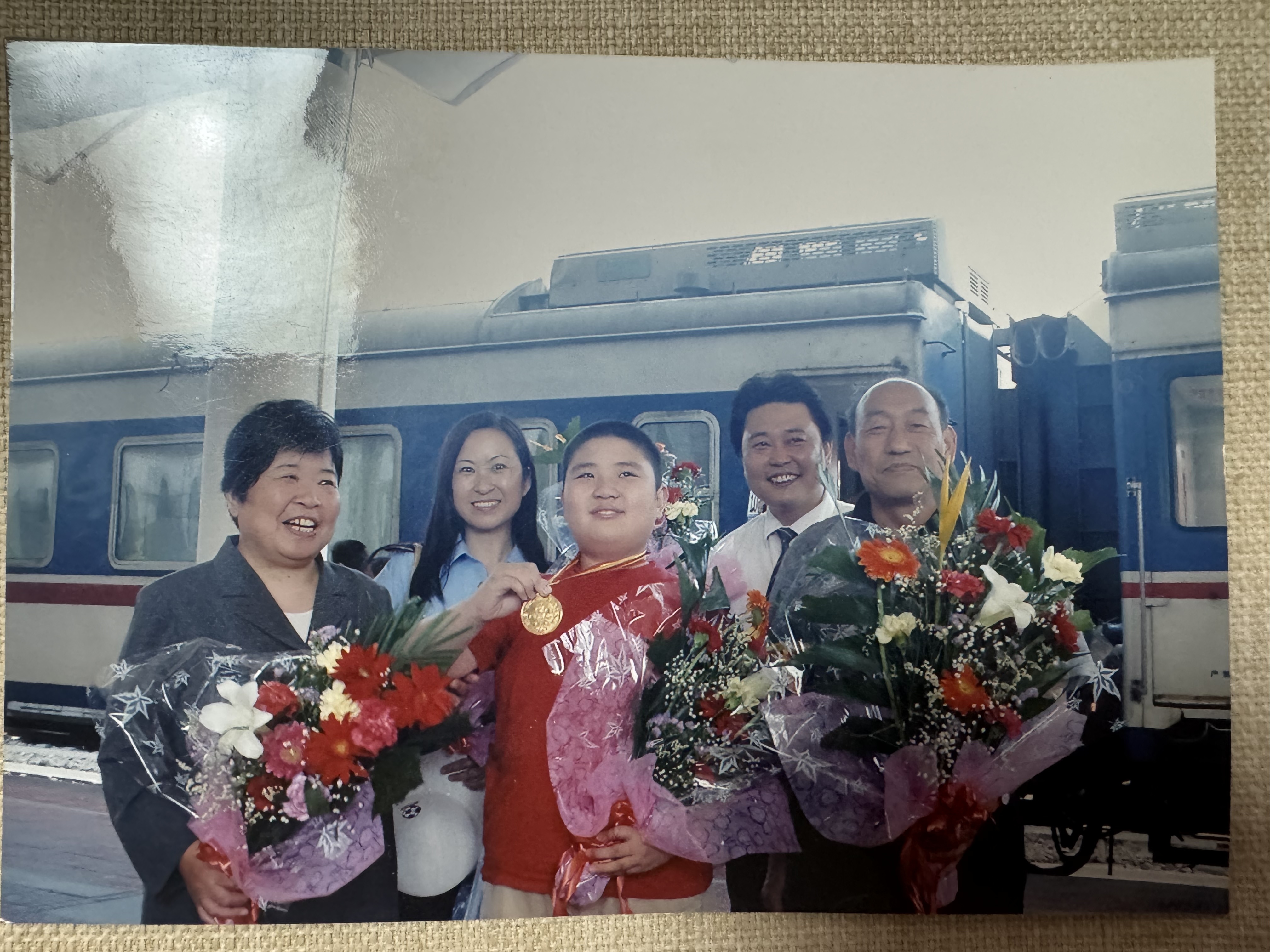 Grandpa and Grandma accompanied me to Chaozhou for the "Hua Luogeng Gold Cup" math competition, where I won a gold medal (only 10 gold medals nationwide)
Grandpa and Grandma accompanied me to Chaozhou for the "Hua Luogeng Gold Cup" math competition, where I won a gold medal (only 10 gold medals nationwide)
Through their words and actions, Grandpa and Grandma instilled a habit of learning in me, and I achieved many accomplishments as a child. However, this also meant I had almost no other interests or hobbies besides studying and struggled to interact with classmates. As I grew older and tried new hobbies, many friends noted that I seemed to improve quickly at anything I practiced, but because I didn’t develop interests as a child, I couldn’t stick with any hobby long-term.
For example, running. Before working, I was quite overweight and barely passed physical education in school. But with the guidance of colleagues like Mr. Ruan at Huawei, I lost 30 pounds in 9 months and completed my first half-marathon a year after starting to run, with a personal best of 1 hour and 54 minutes on my second half-marathon. At that time, I consistently ran 200 kilometers a month, and our team’s total mileage ranked first in the Beijing campus, with my personal mileage in the top twenty. My resting heart rate was also trained to 50-51. However, as work got busier, I ran less, and after starting my own business, I almost stopped running, gaining back the weight, though fortunately, my cardiovascular fitness didn’t decline.
Because Grandma and Grandpa feared I might get into trouble if I played outside as a child, they would pick me up right after school and not let me play with classmates. As a result, I struggled to interact with classmates and felt nervous even buying things at the school store in high school. But Grandpa didn’t see this as a problem because he was also someone who didn’t engage in leisure activities, didn’t like socializing with colleagues outside of work, and didn’t enjoy interacting with strangers. Therefore, many relatives found Grandpa odd, and many classmates found me odd too; perhaps we’re just outliers.
My social skills improved somewhat during university club activities and further during my time at Huawei. At Huawei, I had to communicate with many departments, forcing me to face strangers. Initially, I was afraid to call unfamiliar colleagues and reluctant to attend gatherings. Especially since I’m somewhat face-blind, I struggled to remember names after meeting someone once, leading to awkward situations. My supervisor encouraged me to communicate more and not be afraid. Through this training, my personality shifted from an introverted “I” during my Ph.D. to an extroverted “E” today, and I’m no longer shy around anyone. After starting my business, people who know me can’t believe I was once an “I” person. However, shifting from “I” to “E” doesn’t mean I’m a social expert, as I still lack the ability to read social cues and remember names.
Grandpa was not only introverted but also a serious and reserved person, so he spent his life doing tasks assigned by leaders without pursuing what he truly loved, or even considering what he truly loved. I don’t want to be like that. During my entrepreneurial journey, several friends mentioned that I seem different from most Ph.D. entrepreneurs, appearing more free-spirited, casual, and passionate, while most Ph.D.s seem serious, reserved, and anxious. Even my collaborators say I don’t care much about what the company can achieve, only about what I want to do. Reflecting on this, I realize it’s true; my goal in entrepreneurship is to do what I want. If I just wanted to make money, why not join a promising unicorn company? This is where I differ from Grandpa.
The biggest time I went against Grandpa was in choosing my major.
When choosing between Shanghai Jiao Tong University, Fudan University, and the University of Science and Technology of China (USTC) for college, Grandpa suggested USTC. He wanted me to become a scientist and felt USTC offered a quiet desk to build a solid foundation in mathematics and physics. Grandpa almost got into USTC himself and hoped I could fulfill his dream.
I followed Grandpa’s advice and went to USTC, even getting into the Hua Luogeng Class for math prodigies. But I didn’t study math diligently, failing linear algebra in the second semester of my freshman year and barely passing mathematical analysis. At that time, I was always in the computer lab at the School of the Gifted Young, tinkering with servers and networks. I found computer science much simpler and more useful than math. Studying math seemed pointless, but learning computer science allowed me to create anything I wanted, benefiting many classmates.
Grandpa was very angry and said that mathematics is the foundation of all sciences. I retorted that many fields in computer science don’t require much math. Indeed, developing most software doesn’t require much math, and many research areas in computer science only need elementary mathematics.
I also believe that information has many better properties than matter. The cost of copying information is very low, which makes open-source software and Wikipedia possible. In the material world, it’s hard to find any industrial product with such a low replication cost that it can be supplied for free.
Moreover, the speed of information transmission is naturally the speed of light, capable of crossing interstellar distances, whereas accelerating matter to speeds sufficient for interstellar travel requires impractically large amounts of energy. Therefore, I believe that future intelligence will definitely be digital and may not necessarily need the human body as a carrier.
I don’t remember exactly what my grandpa said, but it was probably something like the famous line from “The Wandering Earth”: “Civilization without people is meaningless.“
However, I eventually followed my heart and switched to a computer science major in the first semester of my sophomore year. I think if I hadn’t switched to computer science back then, I might not have achieved much in mathematics either.
Grandpa’s Influence on My Values
When I was young, grandpa said, “Plant more trees, raise fewer mouths,” which was advice from his parents. The literal meaning of this phrase is to plant more trees, raise fewer animals, and have fewer children. Trees only need watering and fertilizing in the early stages to grow, and once they mature, they require little care to become century-old trees. Animals, on the other hand, need daily care, and once you raise them, you have years of responsibility. My dad and uncle liked to keep pets when they were young, but my grandpa was very opposed to it. Having children was for continuing the family line, and grandpa still wanted children (otherwise, I wouldn’t have my dad and uncle), but he didn’t want to have many children like most people of that era, which would ultimately burden the family.
Grandpa said that not only in life but also in work, one should “plant more trees, raise fewer mouths,” do more things that benefit the present and future generations, and fewer things that stop when you stop working.
Grandpa also introduced me to more outstanding scientists in the geological bureau compound, encouraging me to learn from them. The Hebei Academy of Sciences was right across from the geological bureau, and the family quarters next door were also full of researchers. Growing up in such a compound, I realized that doing research wasn’t something unattainable but just an ordinary profession. Grandpa told me, look at how many people are doing research; if you don’t pursue big achievements or fame, research is as simple as eating and drinking.
Grandpa not only cultivated my interest in science from a young age but also instilled in me a sense of mission in science. Interest and a sense of mission are different. Grandpa said, interest only leads you to the door, but once inside, you’ll find many tedious things, and at that point, a sense of mission is the long-lasting motivation that keeps you going.
In my article “Space Exploration and Digital Life,” I talked about how grandpa cultivated my sense of mission and introduced me to an elderly gentleman involved in aerospace. Here’s an excerpt:
My grandpa liked to tell me about the seafaring feats of the Polynesians. He said that Easter Island in the South Pacific is more than 2,000 kilometers away from the nearest island, yet a thousand years ago, Polynesians lived there and left behind the Easter Island statues. How did the Polynesians migrate across two or three thousand kilometers to get there?
The Polynesians’ migration between islands in the South Pacific is a remarkable feat in the history of navigation. Not only Easter Island but Hawaii was also migrated to a thousand years ago. Because the Polynesians improved their canoes by adding planks to two parallel logs, the boats’ resistance to wind and waves was greatly enhanced, allowing more food and fresh water to be stored on the planks. Moreover, the Polynesians had strong skills in celestial navigation and positioning based on oceanographic conditions. They also needed to choose the right date to set sail. Of course, a journey of several thousand kilometers, lasting several months, was destined to be a life-or-death gamble.
The elderly gentleman involved in aerospace said that today’s space exploration is like the Polynesians’ ocean voyages. Modern people, looking at the Polynesians’ primitive canoes, would wonder how they could possibly cross the two or three thousand kilometers of the Pacific relying solely on wind power. Today’s space exploration is similar because the speed required to escape a planet’s gravity is so fast that it reaches the limits of human fuel capabilities. Sending a little payload into space requires dozens or even hundreds of times its mass in fuel. Moreover, it requires favorable conditions, launching during a narrow window of opportunity.
The elderly gentleman said that luxury goods are for people who have achieved nothing to show off, while exploring the world is the true value of life. Opening a new route on the solar system’s space map is far more valuable than having a fortune. Exploring the universe is certainly not for making money. But without money, it won’t work either; money is a necessary resource for exploring the world. To get this money, you have to make people believe that this endeavor is valuable and that you are the person who can accomplish it. That’s why, even though they know interstellar travel is still far away, they still hang up the solar system’s space map.
When I was in high school, Musk’s commercial spaceflight had just launched successfully, and my grandpa encouraged me to learn from Musk, to see how he managed to launch rockets at such a low cost. Grandpa said that Musk had previously sold several companies and earned enough money to last a lifetime, but he still went into aerospace, investing all his wealth. If he failed again this time, he would basically be bankrupt.
During the NOI winter camp, CCF Secretary-General Du Zide told us that we were currently the group with the highest level of computer skills among students and the hope for the future of Chinese computing. I came back and told grandpa that this was too high a tone. Grandpa said that this is the mission. If I were just an ordinary college student, lying flat and enjoying life would be more comfortable than doing research like an ascetic monk. But if people like me lie flat, some of the more difficult scientific problems will never be solved. Therefore, the motivation that sustains our continuous exploration must not be to make life more comfortable but rather curiosity and a sense of mission.
It’s like grandpa often said, a few hundred years ago, those who did research were all nobles, and their purpose in doing research was not to make more money but for curiosity and a sense of mission. Today, research has become a profession, so most people do it just to make a living. But at the top of this pyramid, there still needs to be people driven by curiosity and a sense of mission.
Grandpa indeed successfully cultivated my curiosity and sense of mission in research. But I also think it shouldn’t be so extreme; work and life still need to be balanced. I believe that research doesn’t have to be like an ascetic monk; doing what you love, being with people you like, and being happy in life can also lead to good work.
Grandpa’s Shortcomings in Life and Family
Grandpa was devoted to his work and spent a lot of effort on my education, but he lacked in many aspects of life.
When grandma first got married, grandpa was always on business trips, and she had to handle everything at home by herself. Grandpa was away on business trips for years, so one would think his life skills should be strong. But according to grandma, grandpa was never very self-sufficient in life. He was unkempt, rarely washed clothes or bathed, and relied on grandma for cooking.
I remember when we made dumplings at home when I was a child, it was always grandma, dad, and mom who were responsible for kneading the dough, chopping the filling, and wrapping the dumplings, while grandpa was responsible for boiling water and cooking the dumplings. Every time, there were always one or two dumplings that broke. When I grew up and learned to cook dumplings myself, I almost never broke any, realizing that dumplings weren’t that easy to break.
Grandma said that before she married grandpa, she saw that his grandfather was a scholar, his mother was a primary school (probably a private school) principal, and grandpa himself studied and worked in Beijing, so she thought the family should be well-off. But after marrying into the family, she found out how poor they were. On their wedding night, when grandma kicked the quilt, it tore with a ripping sound. Flipping it over, there was another big tear. Grandma said she cried at that time, “Entering the Li family, chaff cuts the lips” (cutting is a dialect meaning to scrape).
Grandpa’s mother favored her daughter over grandpa, and coupled with the feudal traditional mindset that grandma was married into the family, she did the most work and endured the most grievances, and grandpa didn’t stand up for her much. She had to take care of the elders above, grandpa, and the children below. When she was pregnant with my dad and uncle, she still worked in the fields with a big belly. After giving birth, she hadn’t even finished her confinement period before she was back working in the fields, otherwise, the family’s land wouldn’t be cultivated.
Grandma always said that her life was destined to be one of suffering. At that time, marriages were arranged, and since grandma was married into the family, she could only accept her fate.
I don’t want my grandma’s fate to be repeated today. I also don’t want to be like my grandpa, focusing only on work all my life, neglecting family, and unable to take care of myself.
In recent years, under my wife’s guidance, my life skills have improved a lot. The house, which used to be messy, now feels dirty, and I take the initiative to clean up. If I were to return to that rented room in Zhichunli, I definitely couldn’t live in such a dirty, messy place. If I were to return to my undergraduate dormitory, I can’t imagine changing the sheets only once every few months and brushing my teeth only every two or three days. Under the guidance of Huawei and my wife, my routine has become much more regular, and I no longer stay up late until the early morning, sleeping until noon.
Forever Remembering Grandpa
From October 7, 1938, to January 12, 2025, grandpa lived an 86-year life. At the end, there was no pain, no resuscitation, no last words, so it was considered a peaceful passing.
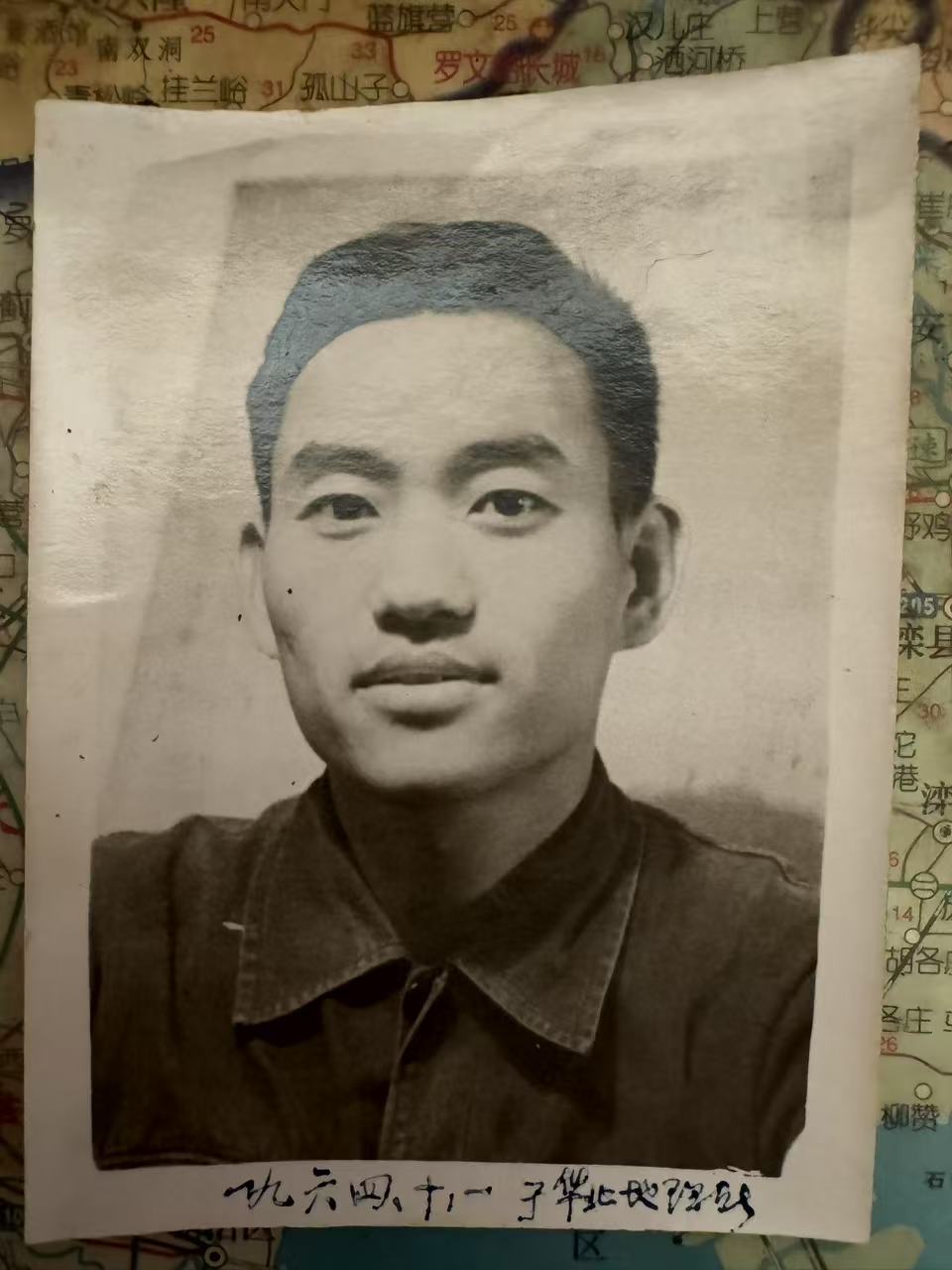 Photo of Grandpa when he was young: October 1, 1964, at the North China Institute of Geography
Photo of Grandpa when he was young: October 1, 1964, at the North China Institute of Geography
Life is unpredictable, and life is finite. In the face of death, everyone is equal.
According to grandpa’s wishes, the funeral was kept simple. There was no mourning hall, only a memorial set up at grandpa and grandma’s home, with just three wreaths downstairs from my father, uncle, and the old cadre department of the Geological Bureau. Close relatives, colleagues, and friends held a brief farewell ceremony at the funeral home, and then the body was cremated.
Grandpa said long ago not to spend too much money after his death; money should be spent on the living. Grandpa said not to have complicated memorial ceremonies; things of commemorative significance will always be remembered by someone, and things without value are useless even if a monument is erected. I think the Hebei Geological Museum is the best memorial to grandpa’s work before retirement. And my growth today is the best memorial to grandpa’s education after retirement.
I hope that if one day I quietly leave, someone can continue to maintain my homepage, just like grandpa’s work is recorded by the museum, always remembered by someone. I also hope that someone can continue the things I have done and will do in the future, not letting something valuable disappear for short-term interests, like Renren Network.